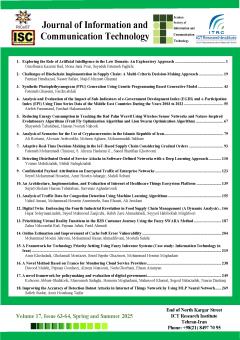A novel framework for policymaking and evaluation of digital government
Subject Areas : ICTKolsoom Abbasi-Shahkooh 1 * , Masoumeh Sadeghi 2 , Homeira Moghadami 3 , Mahmood Kharrat 4 , Sogoul Babazadeh 5 , Nasrin Dastranj 6
1 - IT faculty, ITRC, Tehran, Iran
2 - IT faculty, ITRC, Tehran, Iran
3 - IT faculty, ITRC, Tehran, Iran
4 - ICT Research Institue
5 - IT faculty, ITRC, Tehran, Iran
6 - IT faculty, ITRC, Tehran, Iran
Keywords: Digital government, Policymaking, Evaluation Criteria, Digital government Maturity,
Abstract :
People's lifestyles are experiencing a new paradigm due to emerging technologies such as artificial intelligence, social media, cloud computing and big data, so they are gradually moving towards smarter use of technologies. This kind of intelligence has shown itself in different fields of services, such as government services, and new models have been formed under the title of digital (smart) government. Developed and developing countries have paid more attention to digital government and implemented some of their digital government plans. The approach and method of government services design depend on the relationship between governments and citizens and businesses, and the government (public) organizations' efficiency is dependet to the coverage of goals and satisfaction experienced by citizens. Digital technologies lead to greater efficiency, agility and responsiveness in governments and allow them to respond quickly to the needs of citizens and even anticipate them. Because of these issues, the policymaking of the digital government development as well as its evaluation needs new approaches. Currently, in Iran, digital government development program is considered as one of the main development issues of cyberspace. In this article, it was shown that despite the valuable works that have been done in the field of electronic government development, there is a significant distance to the Digital/ smart government, so attention to the dimensions of the digital government and the appropriate method of policymaking and evaluation can be provided an appropriate mechanism for digital government maturity. In this article, an attempt has been made to extract the different dimensions of digital government from the reference and international models such as the OECD, World Bank, Deloitte and United Nations by using the meta-synthesis method and should provid policymaking mechanisms for its development and evaluation.
[1] Setijadi Prihatmanto, A., Andrian, R., Danar Sunindyo, W., & Sutriadi, R. (2024). Transforming Public Services: A Systematic Review of Smart Government Frameworks, Architectures, and Implementation Challenges. IEEE Access, 12, 135799-135810.
[2] Hans J. Scholl. , Digital Government: Looking Back and Ahead on a Fascinating Domain of Research and Practice. Digit. Gov.: Res. Pract. 1, 1, Article 7 (2020), 12 pages. https://doi.org/10.1145/3352682
[3] Tumennast E., A Smart Government Framework for Mobile Application Services in Mongolia, Copyright © 2017, IGI Global, DOI: 10.4018/978-1-5225-1703-0.ch005
[4] OECD, Recommendation of the Council on Digital Government Strategies, 2014.
[5] OECD digital government policy framework: six dimensions of a government policy, OECD (2020, 1).
[6] GovTech: The New Frontier in Digital Government Transformation, world bank, 2020, https://thedocs.worldbank.org/en/doc/805211612215188198-0090022021/original/GovTechGuidanceNote1TheFrontier.pdf
[7] Furtado, L. S., Ticiana L. C. da Silva, Marianna G., José A., and Jessika K. "A framework for Digital Transformation towards Smart Governance: using big data tools to target SDGs in Ceará, Brazil." Journal of Urban Management 12, no. 1 (2023): 74-87
[8] Anthopoulos, L., Kleanthis S., and Christopher G. R. "Conceptualizing smart government: interrelations and reciprocities with Smart City." Digital Government: Research and Practice 2, no. 4 (2022): 1-28.
[9] Guenduez, A. A., Sebastian S., Tobias T., Kuno S., and Moritz O. "Smart government success factors." Jahrbuch der Schweizerischen Verwaltungswissenschaften 9, no. 1 (2018).
[10] تقوا محمدرضا، تقويفرد محمدتقي، معيني علی و زينالديني محمدرضا. "مدلي براي دولت هوشمند: تبيين ابعاد دولت هوشمند با استفاده از روش فراترکيب." 131-168 (1401)
[11] کلانتري نادیا و شاهپري علیرضا. "ارائه چارچوبي براي استقرار دولت هوشمند در ايران" پژوهشهاي مديريت منابع سازماني. ۱۳۹۴؛ ۵ (۴): ۱۱۵-۱۵۶.
[12] Hassan, I. M., Mahdi, A. A., & Al-Khafaji, N. J. (2014). Theoretical Study to Highlight The Smart Government Components In 21 St Century. International Journal of Computer Science and Mobile Computing, 3(12), 333-347.
[13] Digital Government Index (DGI): 2019 Results, OECD(2020, 2), Avaiable at: https://www.oecd-ilibrary.org/docserver/4de9f5bb-en.pdf?expires=1713264426&id=id&accname=guest&checksum=766F42F03F6E532F4B29A5085E468DE0
[14] Deloitte Insights, seven pivots for government’s digital transformation, Deloitte (2021), available at: https://www2.deloitte.com/content/dam/insights/articles/6974_CGI-Digital-2/DI_CGI-Digital-2.0.pdf
[15] World Bank, Digital Government Readiness Assessment Toolkit: Guidelines for Task Teams. 2020, available at: https://documents1.worldbank.org/curated/en/999901588145595011/pdf/Digital-Government-Readiness-Assessment-DGRA-Toolkit-V-31-Guidelines-for-Task-Teams.pdf
[16] UN, E-government survey 2020, digital government in the decade of action for sustainable development, department of economic and social affairs, New York, 2020.
[17] Finfgeld-Connett, D. (2018). A guide to qualitative meta-synthesis (Vol. 10). New York, NY, USA:: Routledge.
[18] McLeod S., "Metasynthesis of Qualitative Research", 2024, Simply Psychology, DOI:10.13140/RG.2.2.27149.55526
[19] Beck C.، "Mothering Multiples: A Meta –Synthesis of the Qualitative Research"، MCN، The American Journal of maternal /child nursing، Vol.28، No.2،pp.93-99, 2002.
[20] Hoon, C. (2013). Meta-synthesis of qualitative case studies: An approach to theory building. Organizational research methods, 16(4), 522-556.
[21] Lachal, J., Revah-Levy, A., Orri, M., & Moro, M. R. (2017). Metasynthesis: an original method to synthesize qualitative literature in psychiatry. Frontiers in psychiatry, 8, 269.
[22] Noblit G.W.، Hare R.D.، Meta –Ethnography: Synthesizing Qualitative Studies، Stage، Newbury Park، CA 1988.
[23] OECD Digital Government Index (DGI): Methodology and 2019 Results, OECD (2020, 3).
[24] UN E-Government Knowledgebase, 2024, https://publicadministration.un.org/egovkb/en-us/Data/Country-Information/id/79-Iran-Islamic-Republic-of

